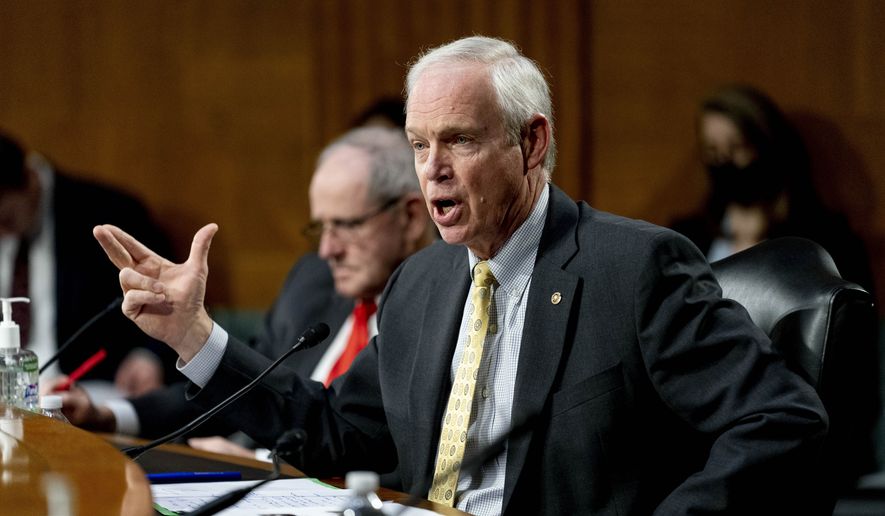Sen. Ron Johnson has gone from tea party insurgent to a top Trump cheerleader in 2022, and Wisconsin voters will decide this year whether they are on board with his political evolution.
Mr. Johnson, a businessman who won his seat in the 2010 GOP wave election, is one of the Democrats’ top targets this year.
They hope voters have tired of Mr. Johnson and his refusal to embrace Washington norms, his outspoken complaints about crumbling borders, his support for overturning Roe v. Wade and his allegiance to former President Donald Trump.
And yet, it was Mr. Johnson’s maverick streak that helped him oust three-term incumbent Democratic Sen. Russell D. Feingold in 2010, and defeat him in a rematch in 2016.
“Sen. Johnson has shown he has a very independent nature,” said Mark Graul, a Wisconsin-based GOP strategist. “He doesn’t mind ruffling feathers of his own party. I think that has certainly been true since Day One.”
Democrats are still searching for their opponent, with an Aug. 9 primary looming.
Lt. Gov. Mandela Barnes led the field, according to a recent Marquette Law School Poll that showed him with a 25% to 21% lead over his closest rival, businessman Alex Lasry. State Treasurer Sarah Godlewski placed third with 9%, and Outagamie County Executive Tom Nelson was running fourth with 7%.
The Democratic contenders and their allies have cast Mr. Johnson as a divisive, self-serving millionaire whose questioning of the 2020 election results, suspicions about coronavirus cures and pro-life stance make him dangerous.
“He has so fully become part of the Washington food fight,” said Joe Zepecki, a Wisconsin-based Democratic strategist. “People are just getting sick of it.”
The Marquette poll did show Mr. Johnson’s favorability sinking over time, to a net negative of 9 points.
Charles Franklin, director of the poll, said Mr. Johnson faced a similar drop in 2015, a year before he faced voters the last time. But he managed to right things by the summer of 2016. This year, Mr. Johnson has shown no such movement.
Still, polling shows him in a statistical tie with the four top Democratic candidates.
“It is really clear in the data that it is partisans coming home who aren’t thrilled with him, but aren’t ready to vote for a Democrat,” Mr. Franklin said.
Mr. Johnson has amplified Mr. Trump’s allegations about widespread voter fraud in the 2020 election, and the House select committee on Jan. 6 shared text messages revealing his chief of staff tried to deliver to Vice President Mike Pence a slate of fake electors backing Mr. Trump.
When confronted with the accusations, Mr. Johnson accused reporters of “carrying water for the Democrat Party.”
Mr. Johnson also has questioned whether vaccines against COVID-19 are safe and effective, asking about vaccine-related deaths and promoting the idea that “standard gargle, mouthwash, has been proven to kill the coronavirus.”
He also said in a conversation with an anti-vaccine doctor that it “may be true” that vaccines cause AIDS.
Mr. Johnson later clarified he doesn’t believe the vaccine causes AIDS and blamed the mainstream media for twisting his remarks to defame him.
Mr. Graul said Mr. Johnson still has a “really strong story to tell” and said he will benefit from the anti-Biden sentiment.
“I think suburban Wiscosnites are pissed off about gas prices, inflation, about crime, about what is going on in schools, and things like that,” he said. “I think that is going to be first and foremost in their minds, and what Ron Johnson said about COVID or 2020 election is going to be secondary on their minds.”
Mr. Johnson’s campaign said those juxtapositions will loom large for voters.
“Ron Johnson delivered needed tax relief for small businesses and millions of Wisconsinites, championed Right to Try [access for terminally ill patients to experimental drugs], and fought to limit the size, scope, and cost of government,” said campaign spokesperson Ben Voelkel. “With Democrats fueling runaway inflation with reckless spending, allowing a border crisis to continue unchecked and weakening America on the world stage, it is critical Wisconsin sends Ron back to Washington to counter their destructive agenda.”
Mr. Johnson portrays himself as a business outsider and “citizen legislator.” He rode the tea party wave of 2010 into the Senate, vowing to reduce the federal deficit and oppose the expansion of the federal government, including by repealing Obamacare.
In 2016, he vowed it would be his last campaign and rode to a second victory aided by Mr. Trump’s upset win in the state.
Despite his final term pledge, Mr. Johnson had a change of heart earlier this year.
In a Wall Street Journal op-ed, he said he wished he could walk away into retirement, but he could not because “countless people … rely on me to be their voice, to speak plain and obvious truths other elected leaders shirk from expressing — truths the elite in government, mainstream media and Big Tech don’t want you to hear.”
• Seth McLaughlin can be reached at smclaughlin@washingtontimes.com.




Please read our comment policy before commenting.